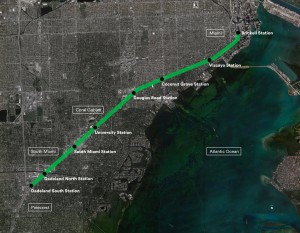After six months of holding public meetings, events and brainstorming sessions, Friends of the Underline will unveil its full master plan for the 10-mile long linear park and trail on Monday.
The Real Deal took a sneak peak at the plans at a private reception on Wednesday.
In addition to providing and improving upon alternative forms of transportation, the project, valued at $120 million when completed, is spurring development nearby, especially in areas such as Coconut Grove and Coral Gables. And it will add to projects such as Brickell City Centre, Brickell Heights and developments near the Miami River, proponents said on Wednesday.
James Corner Field Operations, which also designed the High Line in New York, has designed the Underline’s master plan along with Meg Daly, the founder of Friends of the Underline. Twenty percent, or $24 million, of the project’s total budget will need to be raised privately. The total cost includes $80 million for the trail, $20 million for intersections and $20 million for destination parks.
City of Miami District 4 Commissioner Francis Suarez said he’s advocating for more public funding.
“When you look at its predecessor, the High Line, you see the marriage between a dense and urban city [and parks] that clearly improves the quality of life,” he said. “People want us to reinvest in public spaces because they’re dwindling. They’re hard to come by.”

Map of the Metrorail path
The Underline runs on the M-Path, underneath the Metrorail tracks in Miami-Dade, starting in Brickell and going through Coconut Grove, Coral Gables and South Miami and ending at Dadeland Station. It runs through three municipalities and involves agencies such as the county’s transit department and the Florida Department of Transportation.
James Corner, founder of the design firm, said the project is “challenging because there is no precedent.”
The estimated completion date is 2022.
Challenges include safety issues, working with multiple constituencies, and funding. Seventy to 75 percent of the land will be dedicated to paths, which will be divided into two: one for cyclists and one for pedestrians.
The destination parks will be at the Brickell and University portions and would be a combination of sponsored and privately funded. Individuals can donate trees that cost anywhere from $600 to $6,000; adopt amenities that range from $6,500 to $260,000; and pay for naming opportunities at the Brickell portion, which range from $125,000 to $1.5 million, pending FTA approval.
“Developers like to build, build, build, but they like to build as part of a district,” Corner said. Adding amenities like cafes, parks and outdoor recreation boosts nearby property values. Friends of the Underline has launched a real estate committee to bring in big donors.
The 0.75-acre Brickell portion will be the first, Corner said during the reception on Wednesday, which was held near Brickell City Centre at Building.co. It starts at the Miami River next to American Social – which is located in the Neo Vertika condo tower – and ends at Southwest 17th Street, across from Simpson Park, according to project manager Isabel Castilla of James Corner.
The Underline is also looking at incorporating public art – whether that’s on the Metrorail columns or on the paths – in a meaningful way, Castilla said.
Corner unveiled the Brickell Backyard, which could include areas such as the Oolite Room between 11th and 13th streets; and an outdoor gym between Eighth and Ninth streets. It will be the first area tackled, with $5 million in public funding secured.
The Grove Gallery, between 24th and 31st avenues, would run parallel to businesses such as the Daily Bread Marketplace, which is currently separated by a metal fence. Corner said the Underline could open up those barriers.
The University Colonnade, anchored by the Metrorail station at the University of Miami in Coral Gables, could connect to a pedestrian bridge over U.S. 1, and feature pop-up retail, food trucks and outdoor exercise. The South Miami portion would connect to recreation and healing gardens.
Butterfly gardens, climbing walls, playgrounds and enhanced pathways were among the amenities included in Wednesday’s presentation.
